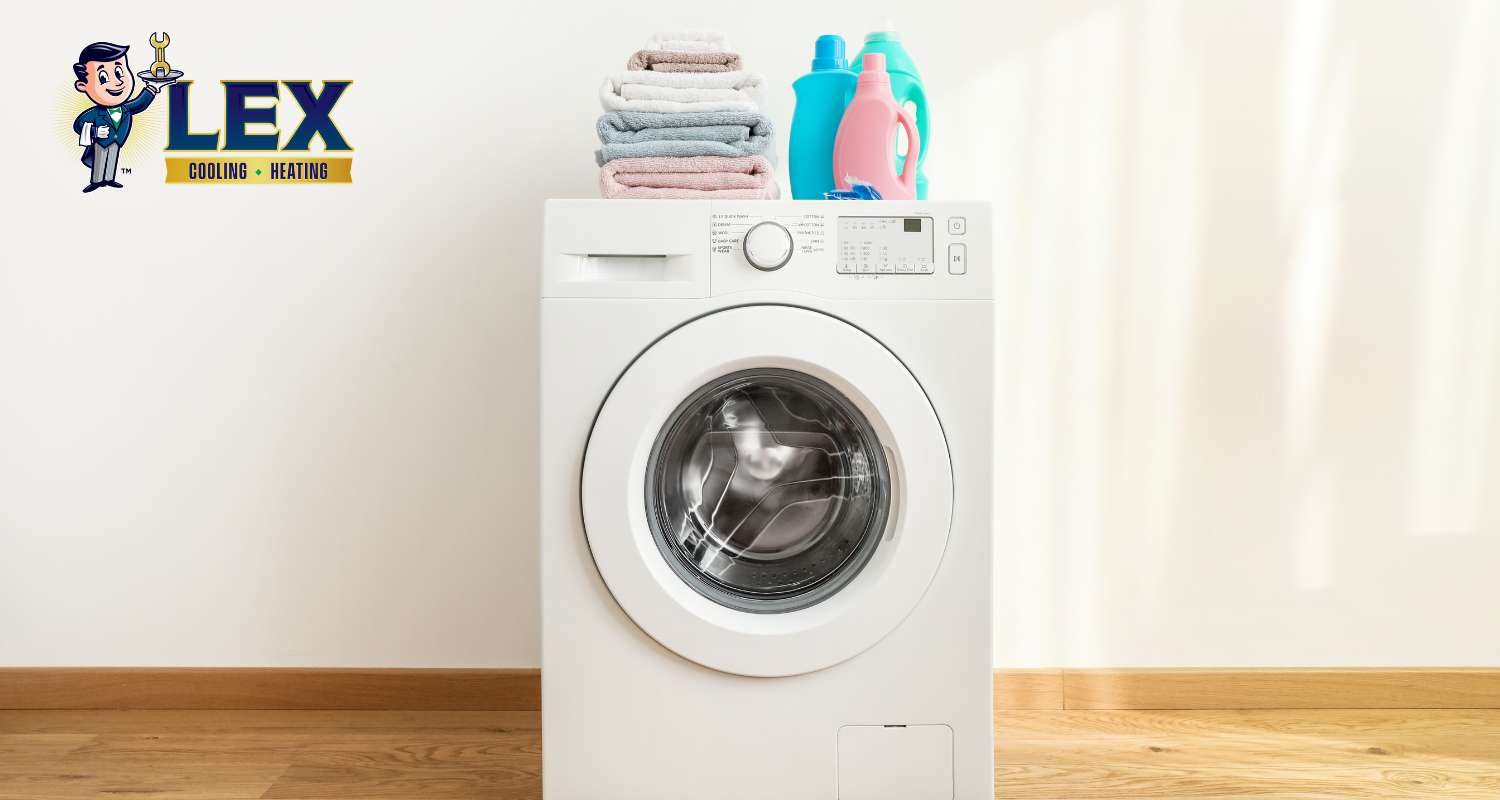If you’ve noticed your washing machine leaking, it is incredibly important that you act quickly to prevent potential damage. Leaks can lead to significant water damage to your home’s structure and flooring, and standing water in the laundry room also provides an ideal breeding ground for mold, which can pose serious health risks.
To address the issue promptly and effectively, contact the Carrollton plumbing experts at Lex right away! Our expert team can diagnose and resolve the leak before it escalates into a more serious problem. Give us a call at (972) 217-8955 today.
Washing Machine Leaking From the Bottom
If your top load washer leaks from the bottom, there may be several potential causes. One possibility is a faulty water pump, which may allow water to escape from the machine. A leaking inner or outer drum is another common issue, particularly with top-load washers. Over time, these drums can develop cracks or damage, causing water to leak out during the wash cycle.
Additionally, if you have a front load washer, the door seal may be damaged or worn, leading to leaks around the door area. It’s important to address leaks promptly to prevent water damage to your floors or surrounding areas. If you’re unsure how to fix the issue, contact a professional appliance repair service like Lex Plumbing to help diagnose and resolve the problem quickly.
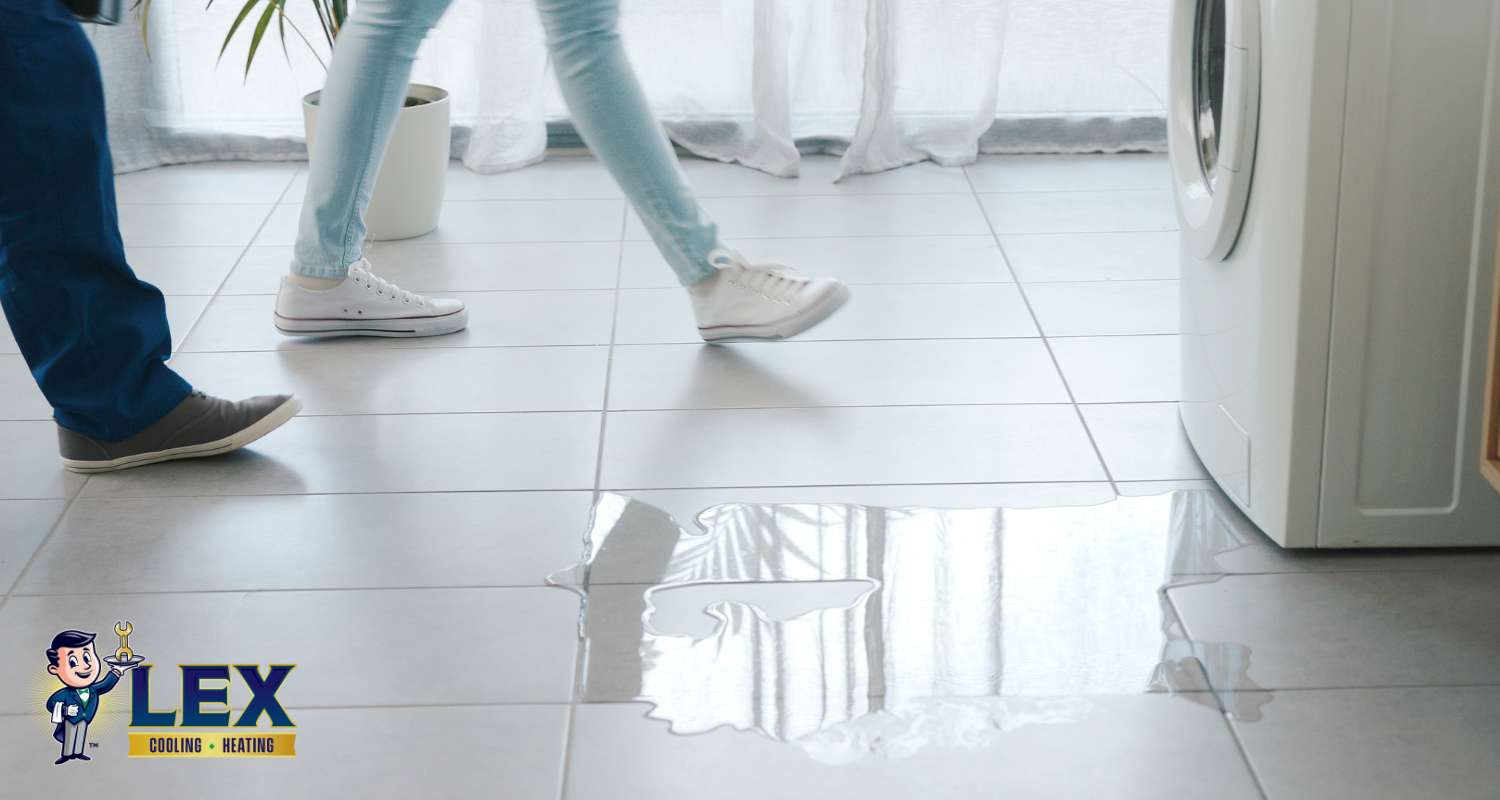
Common Causes of a Washing Machine Leak
Dealing with a washing machine leak can be a real hassle for Carrollton homeowners. Exploring the root causes behind these leaks, whether that’s worn or damaged hoses, a cracked tub, loose fill and drain hoses, or faulty tub bearings, is key to resolving the issue effectively. Below, we’ll take a closer look at some of the most common causes of washing machine leaks.
Worn or Damaged Hoses
One potential reason for a washing machine leaking is worn or damaged hoses, in both top-loading washers and front-load washers. These hoses, including supply hoses, inlet water hoses, and drain hoses, can deteriorate over time due to regular usage and exposure to water and detergents. Cracks, tears, or weak spots in the hoses can lead to leaks during washing.
Loose or Faulty Connections
Washing machine leaks frequently stem from loose or faulty connections, such as fill hoses and drain hoses. These hoses link the machine to the water supply and drainage system. Loose drain hose clamps and faulty connections can lead to a water leak.
Over time, rubber washers within these connections may also deteriorate, further exacerbating leaks. Even a minor pinhole leak can lead to a major water leak during the wash cycle.
Overloading the Washer
When the washing machine is overloaded with too many clothes, it can put excessive strain on various components, including the inner and outer drum and the seals. This strain can lead to compromised seals, resulting in water leaking out during the wash cycle or spin cycle, and causing the machine to become unbalanced. An off-balance washing machine leads to excessive vibration during operation as well as contributes to leaks.

Improper Detergent Use
Too much detergent is another common culprit behind washing machine leaks, regardless of whether you have a front-load washer or a top-load washer. Excessive amounts of laundry detergent can create too many suds that overwhelm the machine’s drainage system, leading to leaks during the wash cycle.
On the other hand, however, using less detergent than recommended may result in inadequate cleaning, prompting you to run additional cycles and thereby contributing to leaks over time.
Faulty Door Seals or Gaskets
Another potential reason behind washing machine leaks is faulty door seals or gaskets, particularly in front load washers. During the wash cycle, the door seal creates a watertight barrier between the door and the drum. Over time, these seals can wear down or develop tears, compromising their effectiveness and allowing water to seep out.
Clogged Drain Pump
The drain pump is responsible for removing water from the machine during the wash cycle and spin cycle. Over time, debris such as lint, fabric, and other foreign objects can accumulate in the drain pump filter, causing it to become clogged. When the drain pump becomes blocked, water can’t effectively drain from the machine, causing a leaky washing machine.
Another common cause of a top-load washer leak is forgetting to remove the manufacturer’s drain plug after installation.
Cracked Tub
Regardless of the type of loading washing machine, a cracked tub is a frequent cause of washing machine leaks. The outer tub and inner tub, or wash drum, of washing machines, can develop cracks over time due to wear and tear or mechanical stress. These cracks can let water seep out during the wash or spin cycle, resulting in a leaking washing machine.
Leaking Tub Seal
Another common reason why your washing machine is leaking might be due to a damaged tub seal, which is located between the outer tub and the wash drum. This seal prevents water from escaping during the wash cycle. Wear and tear to the seal can lead to leakage around the machine, potentially causing excess water to seep out.
Damaged or Faulty Water Inlet Valve
The washer inlet valve controls water flow into the machine during the wash cycle. Over time, these water valves can degrade or develop cracks, leading to a leaky washer. When the washer inlet valve cannot properly shut off the water flow, water can’t drain properly from the machine even when it’s not in use.

Leaking Drain Hose
A leaking drain hose is yet another common cause of a leaking washer. The drain hose carries dirty water from the machine into the drainage system. If the drain hose becomes damaged, loose, or develops cracks over time, it can lead to water dripping and leaks. This leakage often occurs when the washing machine is in the drain cycle, resulting in water pooling around the machine and potentially causing damage to the surrounding area.
Worn or Faulty Tub Bearings
Tub bearings support the inner tub of the washing machine and allow it to rotate smoothly during the wash and spin cycles. Over time, continuous use and wear can lead to deterioration or damage to the bearings, causing them to malfunction. When tub bearings wear out or become faulty, leaking water may result during operation.
Excessive Vibration
Excessive vibration may be another reason your washing machine is leaking. During the spin cycle, the washing machine drum rotates rapidly, generating vibrations. If these vibrations are excessive, they can cause the machine to shift or become unbalanced. As a result, seals and connections may loosen, leading to water leaking from the bottom. To prevent leaks, ensure the washing machine is properly leveled and the load inside is evenly distributed.
Identifying the Source of the Leak
Homeowners can troubleshoot and pinpoint the source of a washer leak by thoroughly inspecting various components. Start by checking hoses and connections for any visible damage or signs of wear, such as cracks or loose fittings. Pay particular attention to the washing machine hose and the drain pipe, as leaks commonly occur in these areas.
Next, inspect door seals and gaskets for any signs of deterioration or damage that could lead to leaks. Look for soap bubbles or water seepage around the rubber seal, especially during the rinse cycle. You’ll also want to examine the washer drum and internal components, including the tub cover gasket and pressure switch, for leaks or cracks. If the washer has a spray rinse function, ensure that the overflow tube is not tilted or clogged, which can cause water to leak.
Finally, check the water pump and drain pump for any signs of damage or malfunction, as a broken drain pump can also lead to leaks. Regularly inspecting these key areas can help homeowners identify and address potential sources of washer leaks before they escalate into larger problems.
DIY Fixes for Washer Leaks
In some cases, homeowners can implement DIY fixes for minor leaks to address the issue before it escalates. Start by inspecting the fill and drain hose for blockages; also, check for any signs of clogged overflow tubes. Clearing a clogged overflow tube or clogged drain hose can often resolve leaks caused by water backing up.
Additionally, ensure the fill hoses and drain pipe connections are securely fastened. If the washing machine hose leaks, tightening the connections or replacing the hose with a new one can help stop the leak. Similarly, if there is a tilted overflow tube, adjusting its position or clearing a blockage can prevent water from spilling out.
Lastly, inspect the power cord and plastic plug for any signs of damage or wear, as faulty electrical connections can also lead to leaks. With these simple DIY fixes, homeowners can often resolve a minor washer leak without professional assistance.
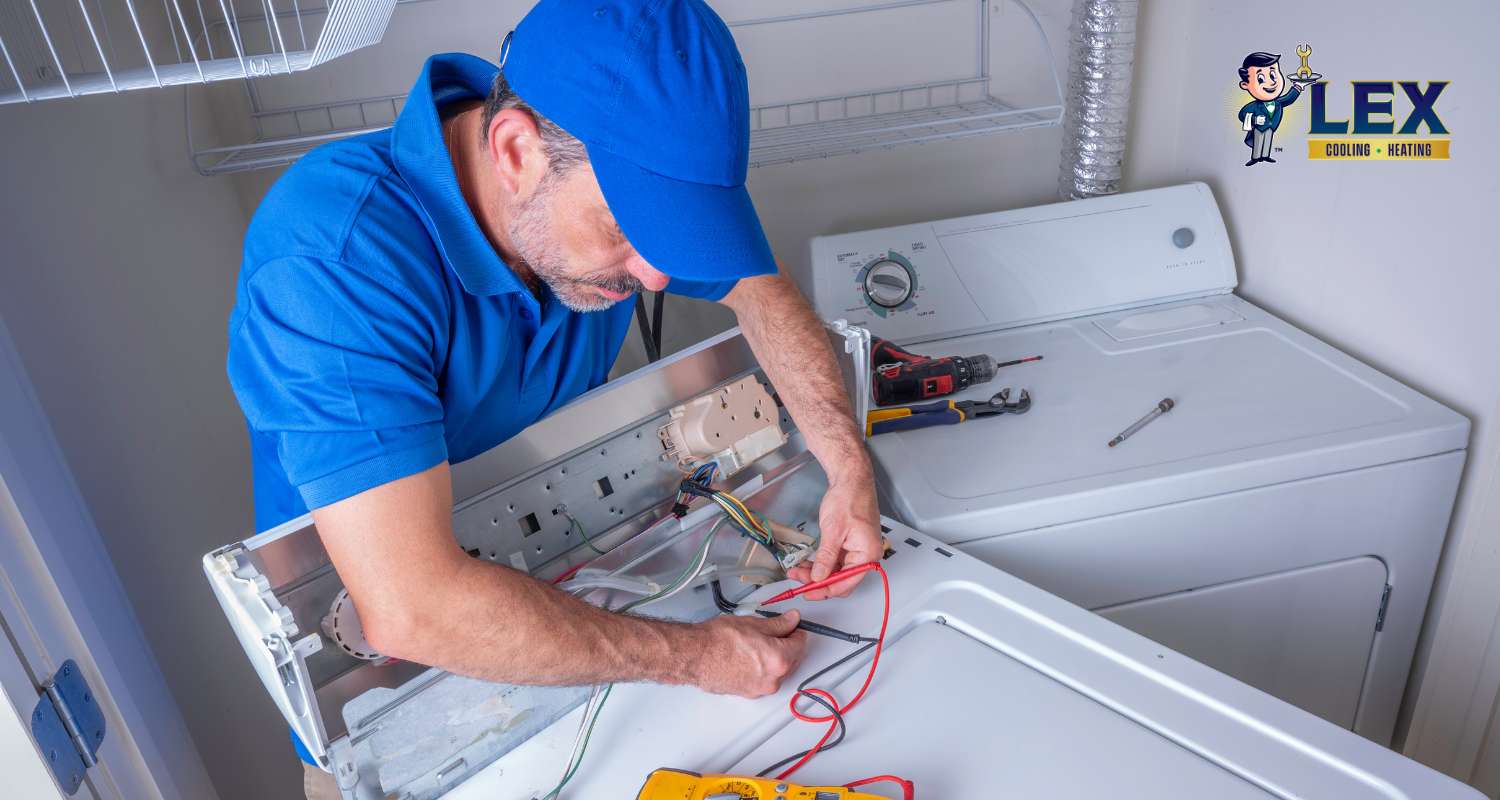
When to Call a Carrollton Plumbing Professional at Lex
If you’ve attempted DIY fixes for a washer leak but it still persists, or if you notice significant water damage, mold growth, or electrical issues near your washing machine, it’s time to call a professional plumber.
For a thorough diagnosis and reliable solutions, trust the experienced Carrollton plumbing professionals at Lex! Our skilled technicians can address persistent leaks, assess water damage, and ensure the safety of your home appliances.
Preventative Maintenance Tips
To maintain your washing machine’s efficiency and prevent potential issues, it’s essential to prioritize preventative maintenance. Tips include:
- Regularly inspect washing machine hoses, connections, and seals for signs of wear or damage. Ensure hoses are securely fastened and free from kinks or twists to prevent leaks, especially in a front-loading washing machine where a loose drain pipe is common.
- Use the appropriate amount and type of detergent to prevent excess suds and buildup that could lead to leaks or other problems.
- Avoid overloading the washer to prevent strain on internal components and minimize the risk of leaks.
- Schedule routine professional maintenance to address potential issues and keep your washing machine operating smoothly for years.
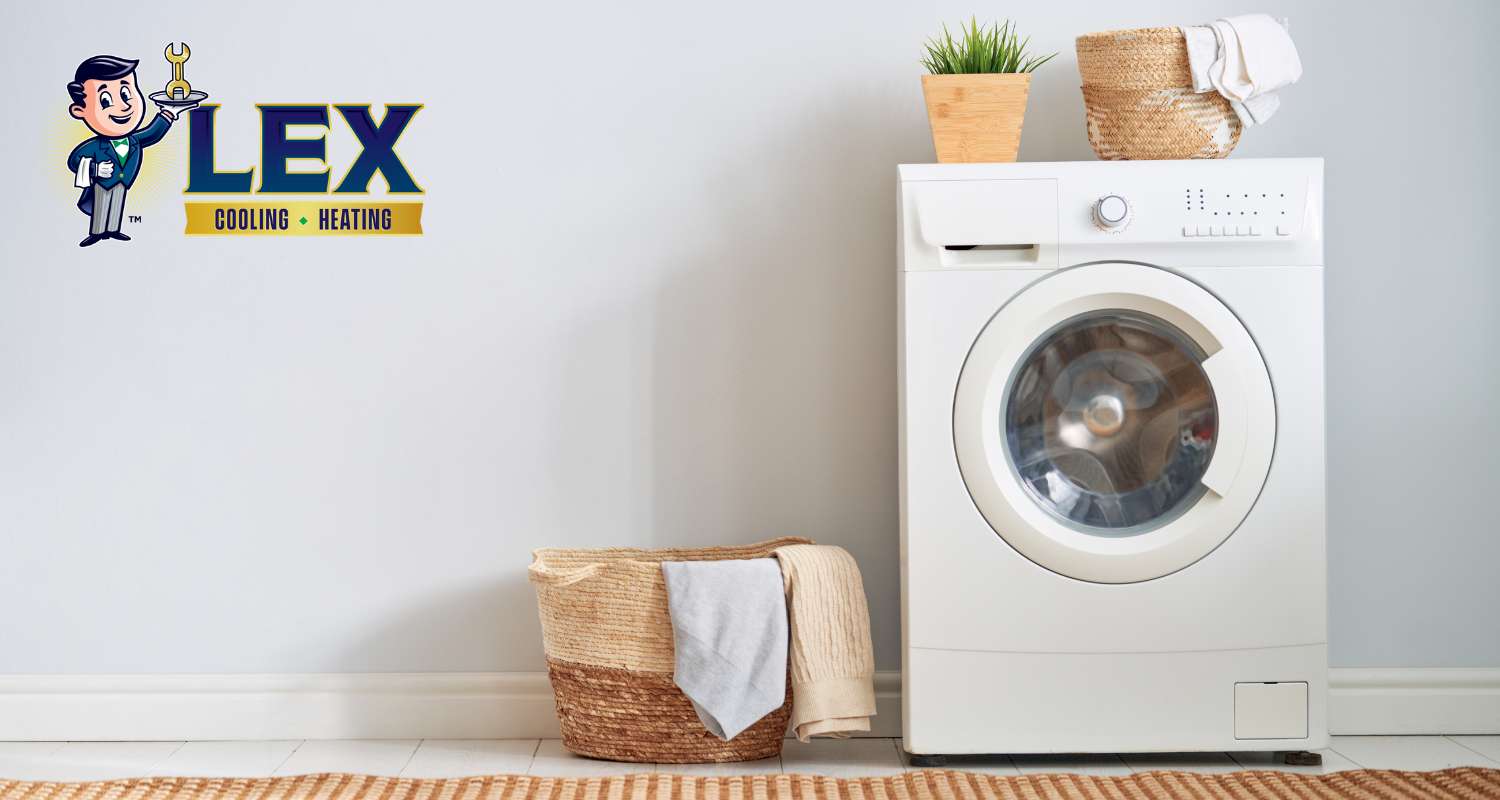
Leaking Washing Machine? Our Team of Experienced Carrollton Plumbers is Here To Help
If you’re dealing with a leaking washing machine, whether a top-loading or front-loading washer, don’t hesitate to contact the experts at Lex Plumbing in Carrollton, TX. From a washing machine hose leaking to a malfunctioning pressure switch, our experienced team is dedicated to quickly diagnosing the issue and providing solutions to get your appliance back in working order in no time.
Call (972) 217-8955 or contact us online today for prompt and reliable assistance with your leaking washing machine.

